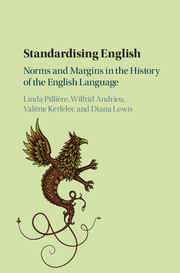Book contents
- Standardising English
- Standardising English
- Copyright page
- Contents
- List of Figures, Maps and Tables
- List of Contributors
- Acknowledgements
- Part I Norms and Margins: Ideology and Concepts
- Part II Norms and Margins: A Historical Perspective
- 4 Norms and Rules in the History of Grammar: French and English Handbooks in the Seventeenth Century
- 5 The End of Toleration? Language on the Margins in Samuel Johnson's Dictionary of the English Language
- 6 Eighteenth-Century Pronouncing Dictionaries: Reflecting Usage or Setting Their Own Standard?
- 7 Setting a Standard: Authors and Sources in the OED
- 8 Conflicting Linguistic Norms in the Letters of Virginian Soldiers during the American Civil War
- 9 Correcting English: Josephine Turck Baker (1873–1942) and the Early American Usage Guide Tradition
- Part III Norms and Margins: Moving into the Twenty-First Century
- Author Index
- Subject Index
- References
5 - The End of Toleration? Language on the Margins in Samuel Johnson's Dictionary of the English Language
from Part II - Norms and Margins: A Historical Perspective
Published online by Cambridge University Press: 02 March 2018
- Standardising English
- Standardising English
- Copyright page
- Contents
- List of Figures, Maps and Tables
- List of Contributors
- Acknowledgements
- Part I Norms and Margins: Ideology and Concepts
- Part II Norms and Margins: A Historical Perspective
- 4 Norms and Rules in the History of Grammar: French and English Handbooks in the Seventeenth Century
- 5 The End of Toleration? Language on the Margins in Samuel Johnson's Dictionary of the English Language
- 6 Eighteenth-Century Pronouncing Dictionaries: Reflecting Usage or Setting Their Own Standard?
- 7 Setting a Standard: Authors and Sources in the OED
- 8 Conflicting Linguistic Norms in the Letters of Virginian Soldiers during the American Civil War
- 9 Correcting English: Josephine Turck Baker (1873–1942) and the Early American Usage Guide Tradition
- Part III Norms and Margins: Moving into the Twenty-First Century
- Author Index
- Subject Index
- References
Summary
- Type
- Chapter
- Information
- Standardising EnglishNorms and Margins in the History of the English Language, pp. 89 - 105Publisher: Cambridge University PressPrint publication year: 2018
References
- 1
- Cited by



